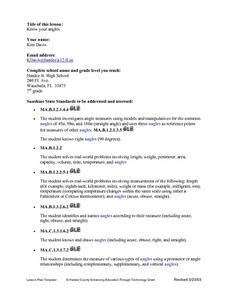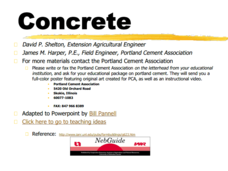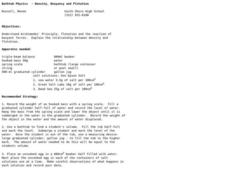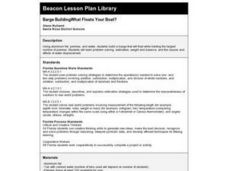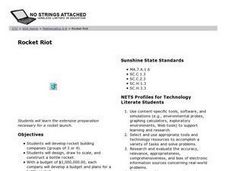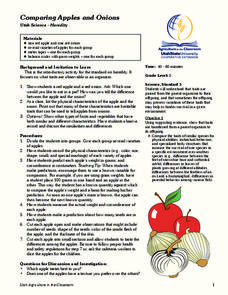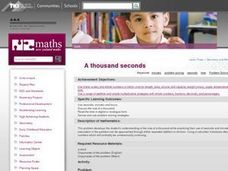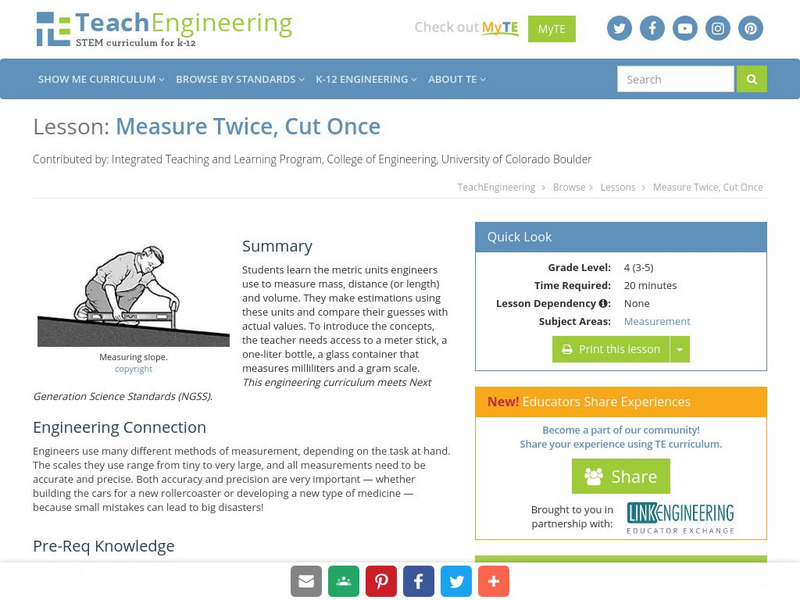Curated OER
Know Your Angles
Explore types of angles and the characteristics of each. After observing a PowerPoint Presentation, learners tour the school facilities and use a digital camera to capture prescribed angles. Using the digital pictures and written...
Curated OER
Concrete
Knowing how to mix concrete is a big part of having a construction job. Here vocational learners will go through the types, economy, and uses for concrete. Each slide is rich in text but organized in an easy-to-read style. Images and...
Curated OER
Bathtub Physics - Density, Buoyancy and Flotation
Learners study Archimedes' Principle, flotation and the reaction of buoyant forces and explain the relationship between density and flotation.
Curated OER
Strength in Size? Madagascar Cockroach Pulls
Fourth graders conduct an experiment involving size and relative ability in smaller species using Madagascar cockroaches. They make predictions about how many pennies the roaches can pull, compare the results to human strength, and...
Curated OER
Density and Buoyancy Lesson Plan
Learners investigate why some objects float or sink in water. In this physics instructional activity, students calculate the density of clay ball using a mathematical equation. They write a complete lab report about the experiment.
Curated OER
DC Metrology
In this physics worksheet, students complete 11 short answer questions related to general metrology. They define basic metrological terms.
Curated OER
Changes in the Copper Penny
Third graders explore the difference between a physical change in a substance and a chemical change. students study the volume, density, altering shape and chemistry of a copper penny.
Curated OER
Beads, Balls, and Beakers
Students analyze the amount of space required to pack round objects. In this geometry lesson, students practice using space economically by practicing packing spheres into beakers. They then translate this concept to molecules being...
Curated OER
Barge Building: What Floats Your Boat?
Students construct aluminum foil boats that float while holding the greatest number of pennies. They investigate the concept of water displacement, record their results, and watch a Bill Nye video on buoyancy.
Curated OER
Proteomics
Students analyze data taken from proteomic experiments. In this biology lesson, students explain the importance of bioinformatics tools in the study of proteins. They evaluate scientific results using math and computer software.
Curated OER
Rocket Riot
Students form "companies" of 3-4 students and build bottle rockets for analysis and experiment. This lesson uses NASA's RcketModeler Version 1.2 rocket simulator to evaluate each rocket's flight.
Facing History and Ourselves
Analyzing Historical Evidence
High schoolers examine World War I war crimes. In this world history instructional activity, students use primary and secondary sources to research and understand the systematic nature of the Armenian Genocide. High schoolers reflect on...
Curated OER
Comparing Apples and Onions
Fifth graders observe and compare apples. In this apples lesson, 5th graders work in groups to record the physical characteristics of a variety of apples. Students predict each apples weight and then weigh them to see if they were...
Curated OER
Osmosis and Diffusion: Egg Lab
Students examine why diffusion and osmosis happen in an egg cell. In this diffusion lesson plan students demonstrate a semi permeable membrane.
Curated OER
Acceleration and You
Students discuss and view examples of acceleration. They work together to determine acceleration rates in two ways. They analyze their data and discuss.
Curated OER
Air Pressure and Wind
Fifth graders study air pressure and learn how it can change the weather. In this air pressure lesson, 5th graders study the given diagrams and complete the experiments to learn how air pressure can change the weather. Students read...
Curated OER
Buoyant Force
Young scholars investigate the scientific concept of why some objects float when put in a liquid solution. They apply the laws of motion and force while conducting classroom activities. Students also take notes and answer target...
Curated OER
How Cool Is Your Environment?
Students study the formulas for calculating heat energy and how to convert Celsius to Fahrenheit. They apply the formulas on a worksheet.
Curated OER
Give Me Energy
Students explore kinetic energy. In this energy lesson students complete an activity and explain what happened.
Curated OER
Don’t be a Stoic about Stoichiometry
Students review balancing chemical equations. In this chemistry lesson, students calculate moles of an unknown substance based on stoichiometric relationships in the balanced equation. They cite applications of stoichiometry in the real...
Curated OER
That Mu You Do
Students discussion frictional force, kinetic friction, and static friction and the role each plays in acceleration and velocity in relationship to a car and the road on which it is traveling. Students complete lesson answering review...
Curated OER
Houses
Third graders use a number of problem solving strategies in this unit of lessons. They determine how to draw and model three-dimensional objects, use co-ordinate systems, determine probability of events, and identify paths of simple...
Curated OER
A thousand seconds
Students use seconds, minutes, and hours. They then discuss the size of a thousand. After that they read time in digital or analogue form.
TeachEngineering
Teach Engineering: Measure Twice, Cut Once
Students learn the metric units engineers use to measure mass, distance (or length) and volume. They make estimations using these units and compare their guesses with actual values. To introduce the concepts, the teacher needs access to...


